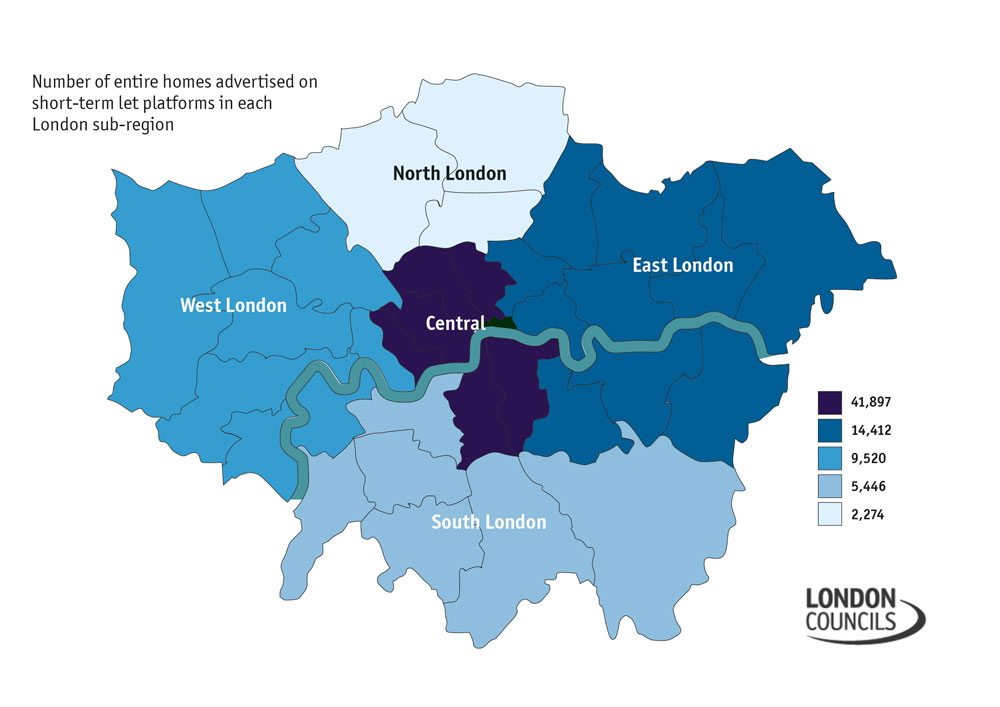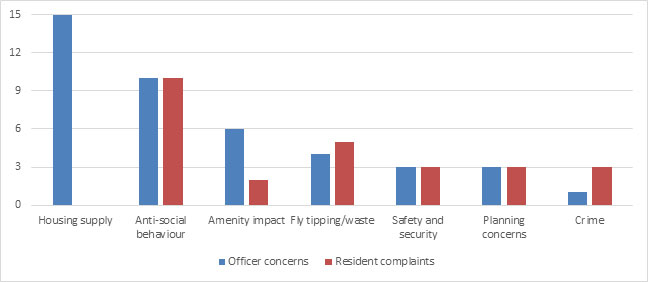The current regulatory environment does not provide local authorities with the powers they need to enforce against breaches of short-term letting rules. This briefing examines the challenges resulting from the rapid and uncontrolled growth of short-term letting in London and sets out the key points in London Councils’ response.
Background
Before the introduction of the Deregulation Act 2015, planning permission was required to let out properties in London for any length of time. When this legislation was introduced, it removed the need for London homeowners to receive planning permission to let their property for less than 90 nights in a calendar year. However, enforcement of this legislation is proving to be an impossible task for local authorities, who do not have access to the information they need to proactively engage with the issue. This is resulting in a drain on officer availability and planning enforcement officers are being drawn away from their work on other crucial issues.
Concerns about short-term letting come in the context of both a local and national housing crisis. More than 56,000 households living in temporary accommodation were placed by London local authorities and the Mayor’s draft London plan sets out a requirement for 649,350 homes to be built over a 10-year period. The proliferation of short-term letting in London risks detracting from the work being done by both public and private sector providers to deliver desperately needed housing. Uncertainties in the current economic environment, amplified by a possible market slowdown of private sector housing delivery and a rapidly growing population, are putting further strain on the efforts of London’s local authorities to deliver quality homes for residents. Meanwhile, this work is being undermined by the removal of permanent residential accommodation from the housing supply by homeowners choosing to advertise their properties on short-term letting sites.
Steps taken by online letting platforms to challenge property owners for breaching the rules are too easily circumvented and data sharing with local authorities have been too limited thus far. Enforcement officers are also concerned that, if they are not able to return properties to residential use quickly, those properties may become immune from enforcement action after 10 years under Section 171b of the Town and County Planning Act 1990.
Data on short term letting in London
One of the key challenges facing local authorities in this area is a lack of data, preventing planning enforcement officers from being able to identify breaches proactively. Some authorities have been engaging in data scraping exercises. Although an imperfect solution, this approach can provide boroughs with an improved understanding of problem areas and hotspots within their authorities, can be used to support formal action in addition to witness logs and sites visits, and demonstrate how hosts are able to cheat the system, through advert duplication, shared rooms within individual units and the inclusion of different photos of the same property.
London Councils engaged with Talk&Code to undertake a data scraping exercise across London, looking at six of the largest online letting platforms. Listings across December 2019 were collated to provide an estimate for the total number of properties being used as short-term lets for at least one night in this time.
The headline findings from this data scraping exercise are below:
| Total number of listings | 108,102 |
| Entire homes advertised | 73,549 |

While Airbnb maintains a dominant presence in the market, advertising more than 68 per cent of all listings picked up by the data scraping exercise in London, they do operate a more diverse portfolio compared to the other platforms. Many of the other platforms are primarily focused on advertising entire properties rather than single rooms within an owner’s residence and, when considering only listings advertised as ‘entire homes’, Airbnb’s share drops to 57 per cent. While still a dominant proportion, this highlights any single platform’s limitations in attempting to self-regulate within this market, as they will only have access to one share of the data. Where listings for properties have been duplicated across multiple platforms, those individual platforms will not be best placed to identify whether the total number of nights have risen above 90 nights.
Data supplied by Airbnb to the London Borough of Hackney suggested that less than 3 per cent of properties hosted on Airbnb in the borough, equal to approximately 200 units, were violating the 90-day rule. However, this will not account for properties which are also let out on other platforms, bringing the combined length of lettings above 90 days. The platform is currently unwilling to provide the details of these properties and it is unclear what proportion of these units are entire homes. Ongoing research from the London Borough of Camden has indicated that, of the 7,000 properties used as short-term lets in Camden in 2019, 48 per cent exceeded the 90-day limit, significantly higher than the figures that Airbnb are suggesting elsewhere.
In Westminster, enforcement officers have been building an evidence base highlighting the growth of short-term letting in the borough to an industrial scale, with entire blocks of flats being converted from assured shorthold tenancies into persistent short-term lettings. In one instance, 115 short-term lets were identified in a block of 117 flats.
Survey of London boroughs
The charts below highlight the key concerns raised by London’s planning enforcement officers and residents, showing the proportion of responding boroughs that highlighted these as a key issue. While a range of issues were indicated, the impact on housing supply, antisocial behaviour and waste all feature highly. In many cases the concerns of residents and officers appear to align, although there was some divergence, such as the concern for the impact on housing supply highlighted by enforcement officers.

| Number of complaints received | Complaints in 2016 | Complaints in 2018 | Estimated officer time in 2018 (hours) |
|---|---|---|---|
| Borough 1 | 413 | 490 | 14,112 |
| Borough 2 | 26 | 101 | 800 |
| Borough 3 | 58 | 67 | 1,340 |
| Borough 4 | 24 | 25 | 400-650* |
| Borough 5 | 15 | 17 | 1,500 |
| Borough 6 | 8 | 17 | 100 |
| Borough 7 | 11 | 13 | 400 |
| Borough 8 | 1 | 5 | 40 |
| Borough 9 | 0 | 5 | 20 |
| Borough 10 | 0 | 3 | 45 |
| Borough 11 | 2 | 1 | 12 |
| Borough 12 | 0 | 1 | 10 |
*Borough 4 estimate unavailable – indicative figure above based on responses of other boroughs
Key challenges
Short-term letting brings benefits, but its rapid growth has outstripped London local government’s capacity to keep up, enabling property owners to game the system and avoid punishment for rule violations. The key challenges resulting from uncontrolled short-term letting practices include:
- The loss of badly needed permanent residential accommodation.
- An increase in noise, anti-social behaviour and crime.
- Incorrect treatment of significant quantities of commercial waste as domestic waste, resulting in additional costs for the local authority.
- Safety concerns, both for local residents and guests staying in short-term letting accommodation.
Commentary
Homeowners who are renting out their primary residence for short periods of time while they are on holiday do not tend to be responsible for many of the problems associated with short-term letting. This is within the original aim of the practice. However, when property owners primary intention for a residential unit is to rent it out frequently on a short-term basis, this risks impacting the housing supply and the community cohesion of the area, as residents begin to feel frustrated that their neighbourhood is being treated as a commodity. The transient nature of the visitors brought into the area by short-term letting allows for occurrence of crime and antisocial behaviour and can be particularly difficult for the police to monitor.
The Deregulation Act 2015 has enabled property owners to more easily hide their actions from local planning authorities. Responses to the recent survey completed by planning enforcement officers highlighted growing concerns regarding properties which appear to be used exclusively for short-term letting purposes. Absent suitable intervention at a legislative level, even the most egregious cases will remain difficult to stifle.
London Councils is therefore calling on the government to legislate for at least a mandatory registration scheme for property owners seeking to let out their property on a short-term basis. This must be accompanied by improved powers for local authorities to ensure the effectiveness of this scheme. These measures will provide enforcement officers with the information they need to more effectively engage with and police the industry.


